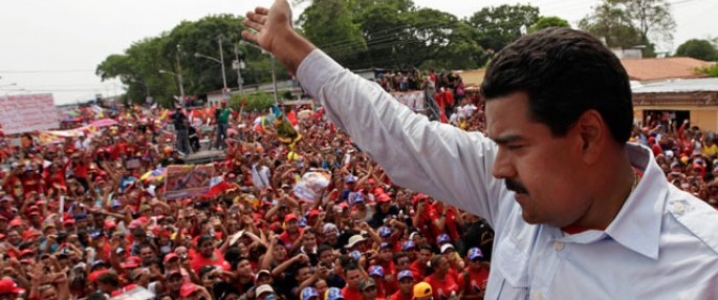Venezuelan President Nicolas Maduro was inaugurated for a second term on Thursday, despite presiding over an economic meltdown of historic proportions and his status as an international pariah.
A coalition of 13 countries in the Americas, dubbed the Lima Group, announced in early January that they would not recognize Maduro as legitimate. The Lima Group includes Brazil, Canada, Chile, Colombia, Costa Rica, Guatemala, Guyana, Honduras, Panama, Paraguay, Peru and St. Lucia.
The countries issued a statement that said the May 2018 reelection of Maduro “lacks legitimacy,” and they condemned “the breakdown of the constitutional order and the rule of law in Venezuela.” They urged Maduro not to assume office and recognized the opposition in the national assembly as the legitimate authority in Venezuela.
Needless to say, Maduro has not taken their advice to heart. He used the condemnation from the Lima Group as evidence that the U.S. was orchestrating a coup.
Although he has eviscerated democratic checks on his power and has increasingly ruled as a dictator, his grip is by no means secure. An apparent assassination attempt last August via exploding drone offers up some evidence of the internal danger facing Maduro. The New York Times also reported in September 2018 that Venezuelan military officers had met with Trump administration officials, seeking support for an overthrow.
Meanwhile, more than 3 million people have already fled Venezuela, and millions more could leave in the months and years ahead.
New sanctions from countries in the Lima Group have targeted top Venezuelan officials. Peru, for instance, announced sanctions on 93 high-ranking government officials and their families. The U.S. also unveiled a new round of sanctions aimed at former Venezuelan treasury officials and the country’s largest media company for illicitly making money off of the currency market. Related: The Natural Gas Crash Isn’t Over
The array of sanctions from multiple countries were all timed to coincide with Maduro’s inauguration for a second term.
Still, the U.S. and other countries have held off on aggressively targeting Venezuela’s oil sector, which has been Maduro’s (and the country’s) one lifeline, even as output has been in free fall for more than a year.
Notably, however, PDVSA may have managed to slow the decline more recently. The state-owned oil company repaired two heavy-crude upgraders operated by joint ventures with international companies, which helped keep production from falling below 1.1 million barrels per day (mb/d), according to Argus Media.
The plunge in Venezuela’s oil production cannot be chalked up to any one single problem. A shortage of cash for maintenance, an exodus of workers, a lack of diluent to process heavy crude, debt claims by foreign companies, damage to port facilities – deterioration at every stage of the country’s oil sector has contributed to a downward spiral of output. Related: WoodMac: LNG Glut Not Likely In 2019
The recent repair of upgraders at the PetroMonagas and PetroPiar joint venture operations may have staunched the bleeding a bit. The upgraders process heavy crude from the Orinoco Belt using imported naptha, diluting the crude so that it can be turned into an exportable product. A partial restart of a refinery on the island of Curacao also appears to be in the offing, according to Argus, although the impact of such a development is unclear. The refinery is a century old and has a nameplate capacity of 335,000 bpd, but was offline for most of 2018 due to a lack of oil feedstock and “broken utility services,” Argus says.
The repairs could mitigate further losses, or least slow the rate of decline. Francisco Monaldi, a fellow at Rice University’s Baker Institute for Public Policy, sees oil production bottoming out at about 850,000 to 900,000 bpd, although he hedged that estimate in an interview with the FT, saying that “if prices are below $50 per barrel then the decline could be steeper.”
The EIA says production could fall below 1 mb/d in the second half of this year before declining further to 700,000 bpd by 2020.
By Nick Cunningham of Oilprice.com
More Top Reads From Oilprice.com:
- Colombia’s Oil Rebound Off To A Rough Start In 2019
- OPEC’s No.2 Boosted Production, Exports Just Before Cuts Began
- The 3 Continents Driving Global Energy Demand


















